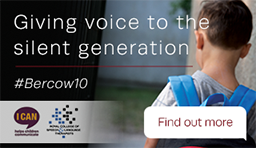The Institute, together with leading organisations from the world of children’s health and social care, education, justice, disability, has co-signed a letter sent to the Prime Minister calling for more action to improve support for children and young people with speech, language and communication needs (SLCN).
Dr Cheryll Adams CBE, Executive Director of the Institute of Health Visiting, said:
“The iHV is pleased to co-sign such an important letter to raise the need for better support for children and young people with speech, language and communication needs (SLCN). We are delighted to already be working with PHE and DfE on new training for health visitors to help close the language gap between disadvantaged children and their peers (as announced last week). However, there is plenty more to be done to tackle the inequality of services – further actions are needed to improve the life chances for these children and young people, enabling them to reach their full potential.
“We fully support the call for joint commissioning to put an end to the postcode lottery of support for these children and young people. In addition, the implementation of a cross-Government strategy for children and young people would enable children and young people to fulfil their potential.”
Coordinated by I CAN, the children’s charity, and the Royal College of Speech and Language Therapists (RCSLT), the coalition of over 60 organisations has sent an open letter to the Prime Minister calling on the Government to tackle the inequality of services for some 1.4 million children and young people with SLCN in the UK. The coalition wants to see urgent action in five key areas, which will improve the life chances for these children and young people, enabling them to reach their full potential.
The coalition urges action on:
- Joint commissioning to put an end to the postcode lottery of support for these children and young people;
- Support for children and young people with long-term, persistent SLCN, who require some level of specialist help during and beyond their early years;
- Providing professional development for those working in education, including teachers and teaching assistants, to enable all children and young people to develop language and communication skills. Teachers also need to be able to identify children and young people with SLCN as early as possible so they can be supported effectively;
- Incentivising schools to give speech, language and communication the priority it deserves;
- Training practitioners who are working with vulnerable children and young people, including; looked after children, those in the youth justice system or who are living with mental health issues, in how to recognise SLCN and respond effectively. They must also have access to specifically commissioned speech and language therapy services for those children and young people who need them
The letter to the Prime Minister comes as I CAN and the RCSLT publish the first anniversary update to their joint report, Bercow: Ten Years On, which looked at the state of provision for children and young people with SLCN in England. Of the 47 recommendations for action made in the report, 17 of them have been implemented. However, far more needs to be done by the Government.



